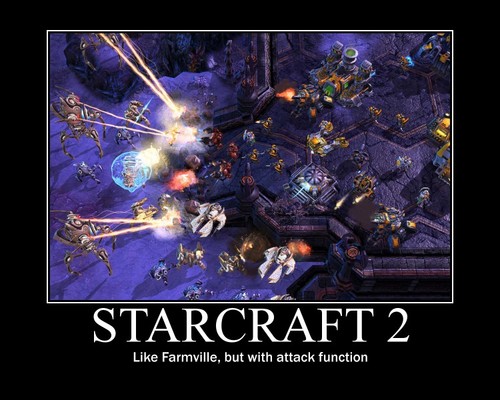Anti-Depressants Used Against StarCraft Addiction
It's safe to say I went a bit nuts during the launch of StarCraft II. Though grown-up responsibilities kept me from playing all day long, I did queue for upwards of two hours to get it at midnight and there were definitely times when I passed up the chance to leave the house or eat lunch because I was too engrossed. "Gimme a sec, I'm kinda low on Vespene gas," was my default response to any questions or comments thrown my way. However, it seems my 'problem' is not as bad as bemused friends and family would think. After all, I don't need anti-depressants to stop the cravings, do I?
According to research carried out in Korea, Bupropion, a popular anti-depressant sold under a variety of different names, has the ability to decrease cravings for Internet game play as well as the brain activity triggered by video game cues. Gamepron reports that a team of Korean scientists decided to test this theory on a group of StarCraft-addicted gamers and found that those who took a short course of the drug seemed to improve significantly.
The team rounded up 11 gamers who all admitted to playing SC for at least four hours per day, or 30 hours per week. Though it doesn't sound like much, Gamepron reports that more than half of these gamers had been absent from school for two months, and two of them had been through divorces as a direct result of their affinity for StarCraft. Also in the test group were eight more StarCraft fans that claimed to play SC for about an hour a day, three days per week.
Scientists recorded the gamers' brain activity at the start of the test using an MRI machine and a bunch of StarCraft cues. Results revealed that those with heavy addictions showed higher left-hemisphere brain activity when shown the cues.
The addicted gamers were then put on a six-week course of slow-release bupropion to try and combat their addiction. Once the course of treatment had been completed, they were retested with the MRI machine and game cues. Gamepron reports that though they still showed levels of left-hemisphere brain activity higher than the casual gaming group, the left-hemisphere brain activity was lower than at the beginning of the study. The gamers also reported experiencing fewer cravings, played for fewer hours and a reported a decrease in their Internet Addiction Scale scores.
Get Tom's Hardware's best news and in-depth reviews, straight to your inbox.

Jane McEntegart is a writer, editor, and marketing communications professional with 17 years of experience in the technology industry. She has written about a wide range of technology topics, including smartphones, tablets, and game consoles. Her articles have been published in Tom's Guide, Tom's Hardware, MobileSyrup, and Edge Up.
-
JOSHSKORN Why not just enroll in a swimming class or some other form of activity? Geesh. No need to make the drug companies rich over a video game.Reply -
griddlez Hmm, I play more than that. In-fact I leave SC2 on all the time just so when I return from work I can log in quicker.Reply
Who's for some FFA?! -
JMcEntegart sliemReally? Jane is addicted to SC2? I can't believe it.Reply
It's not an addiction it's an interest. -
mlopinto2k1 JOSHSKORNWhy not just enroll in a swimming class or some other form of activity? Geesh. No need to make the drug companies rich over a video game.You gonna tell that to an addict? Hey man, just put down the pipe and start swimming... you'll feel better in no time. These people are ADDICTED to this crap.Reply
-
Why is it so hard just to say no more and put it down? It isn't, it's just immature and weak willed/minded people.Reply
I bet this will get down thumbed by those who can't face the cold hard truth. -
tetracycloide mlopinto2k1You gonna tell that to an addict? Hey man, just put down the pipe and start swimming... you'll feel better in no time. These people are ADDICTED to this crap.Compulsive gaming is not an addiction. Compulsive disorders can fixate on gaming the same way they can fixate on washing hands or eating but they're not the same thing. There's no such thing as 'gaming addiction.'Reply
